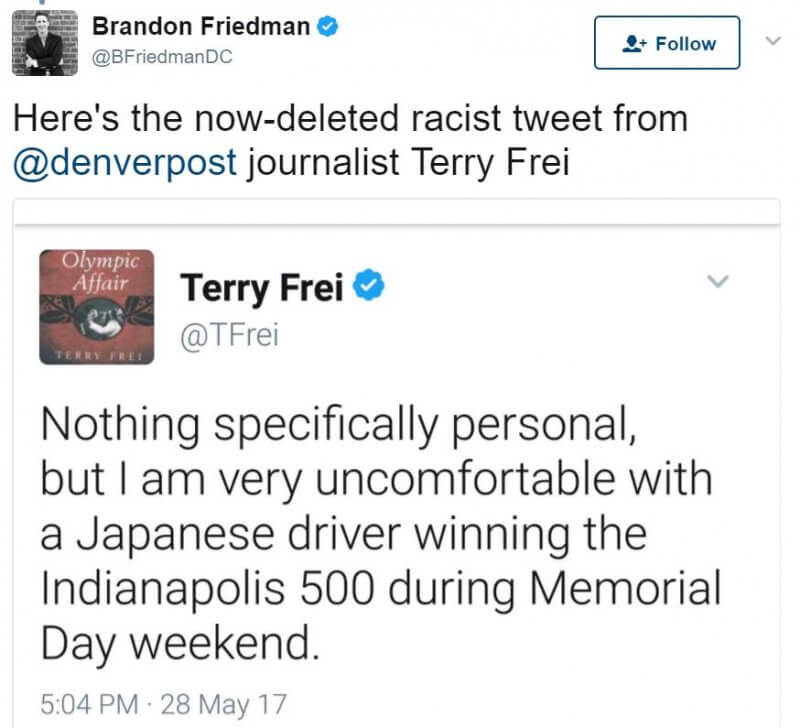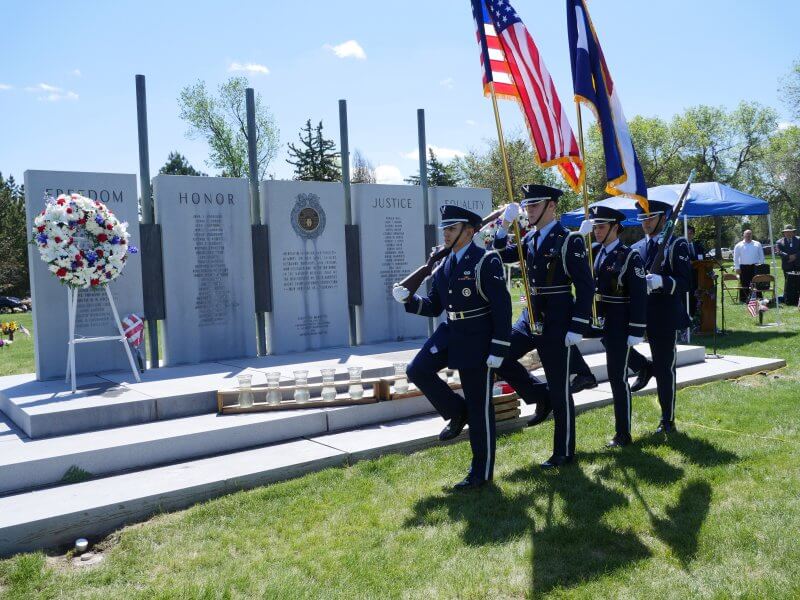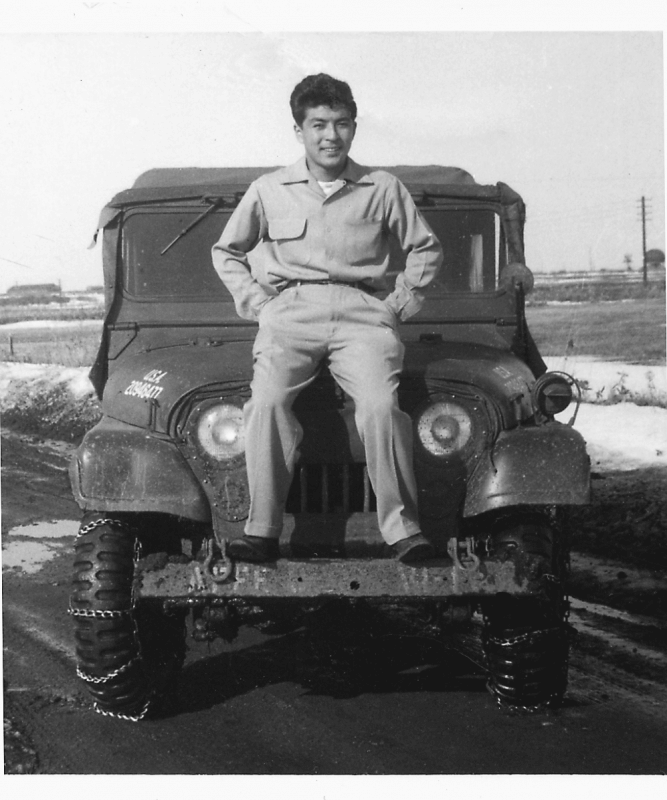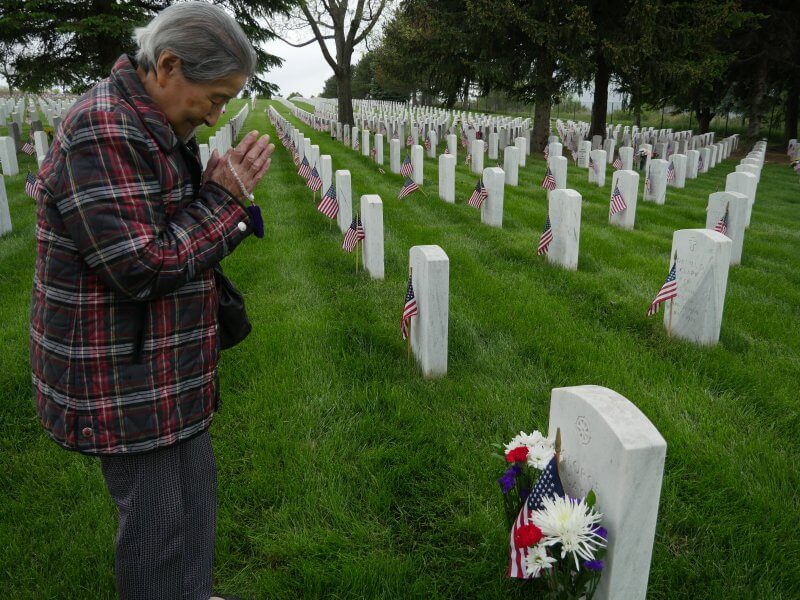 I wasn’t surprised that anti-Japanese sentiments were expressed when Takuma Sato, a Japanese driver, won the Indianapolis 500 race — he is the first driver from Japan to take the flag. But I was shocked, and disappointed that the hateful sentiment was blurted by a journalist. In Denver, where I live. And that it was someone I had worked with.
I wasn’t surprised that anti-Japanese sentiments were expressed when Takuma Sato, a Japanese driver, won the Indianapolis 500 race — he is the first driver from Japan to take the flag. But I was shocked, and disappointed that the hateful sentiment was blurted by a journalist. In Denver, where I live. And that it was someone I had worked with.
Terri Frei, a veteran sports writer for The Denver Post whose main beat was the Colorado Avalanche hockey team, tweeted shortly after Sato’s historic victory, “Nothing specifically personal, but I am very uncomfortable with a Japanese driver winning the Indianapolis 500 during Memorial Day weekend.”
The comment sparked a social media furor, and within 24 hours, on Memorial Day, The Denver Post announced that Frei no longer worked for the newspaper.
I didn’t know Frei well, but I worked with him, when I managed the DenverPost.com website. I was bewildered that he would post such a blunt, ethnically charged statement.
He deleted the tweet, but not before a lot of people copied it and spread it across the internet. I saw it when a friend forwarded me a link. I criticized Frei for posting it with a quick post of my own, on Facebook:
I worked at the Denver Post, I’m embarrassed to say. I wonder what my former colleague Terry Frei thought about my running the website that featured his sports coverage? Was he ‘very uncomfortable’ with me having power over his content? What’s his logic for this now-deleted tweet? What does he feel about Italians, or French drivers, or Latino or African Americans behind the wheel? If his objection is because it’s Memorial Day weekend, would he feel the same about a German (or Italian) driver winning the race? And does he have ANY IDEA about the 100th Battalion/442nd Regimental Combat Team, which fought — and died — during WWII and remains to this day the most highly-decorated unit in the history of the United States military????? What was he thinking?

Within a few hours, Frei’s blunder had made national and then international news. By the morning of Memorial Day, The Denver Post must have felt they had no choice.
For the record, I think the Post should have punished him but kept him on staff, and then assigned him to cover the annual commemoration of the atomic bombing of Hiroshima then spend a week filing a story a day getting to know the people and culture of Japan.
I found out about Frei’s fate after the annual Japanese American Community Memorial Day Service at the Nisei War Memorial at Denver’s Fairmount Cemetery.

I was interviewed by a local TV reporter for my reaction, and the report focused on my father, whose name is etched on the Nisei War Memorial, on the back where all Colorado JAs who served in the US military no matter the war are listed after they pass away. My dad fought during the Korean War, but he never held on to any animosity toward Koreans, and he certainly never passed on any negative attitudes about Koreans to me.
After he deleted his tweet, Frei posted a terse message: “I apologize,” which was followed by a link to an excerpt of a book he had written about a college football team from the early 1940s, on which his father played. His father went on to fly missions in the Pacific against Japan, and his father’s best friend was killed during the Battle of Okinawa. In a subsequent explanation, Frei said his research for that book had made him emotionally connected to Americans who fought against Japan. He had also gone to Fort Logan, Denver’s military cemetery, to pay respects to his father after he posted his tweet.

As it happens, I was at Fort Logan too, with my mother and my wife, the day before to pay respects to my dad at his final resting place. It’s a pilgrimage we make every Memorial Day weekend with my mom.
I don’t think Frei is racist. But I do think his tweet came from someplace deep down in his soul, and that it was an honest statement in that moment. Although it’s 72 years since World War II ended and Japan and the US are now very close allies, the thought of a Japanese man in the spotlight on Memorial Day weekend bugged him.
What’s sad is the raw, naked nationalism reflected in his tweet isn’t unique to Terri Frei. It festers with more people than I care to think about.
I know that because I wrote about the wave of anti-Japanese social media attacks in the days following the March 11, 2011 earthquake and tsunami that devastated a large swathe of northeast Japan. The most common comment was that the disaster was god’s revenge for Japan’s attack on Pearl Harbor at the start of WWII, as if the US bombing of Hiroshima and Nagasaki didn’t count as retribution enough.
Terri Frei made a huge mistake as a public figure who should have given a little thought before he pressed the “Tweet” button. But he’s not the only one out there who thinks the same way.
That’s the challenge. The problem is much bigger than Terri Frei.
Here’s my interview with KUSA 9News.
Here’s a story in the Denver alternative weekly Westword (where I served as reporter and music editor for a decade) with an interview with Frei











My thoughts resonate with yours. My mother was a Hibakusha. When I visit schools or conferences to discuss her experience and my book about it, some are surprised that there was prejudice when she came to the US in 1959. Ironically, the state she settled in was the only state to still celebrate VJ day. At times, I’ve heard some hurtful comments in regard to the atomic bomb. My hope is that by discussing how similar the Japanese children’s (my mom was 12 on that horrific day) hopes and fears were to the Allied children perhaps they can understand that the ones we may think of as our “enemy” are not always so different from ourselves. A message that needs to be out there now more than ever.
Thanks for your comment, Kathleen! What state was that? That must have been really uncomfortable to be someplace that commemorated VJ Day over a decade after the war…. Thanks for speaking to kids — that’s so important!
It is Rhode Island. They call it Victory Day now. But growing up it was still VJ day(and through the 1990s)and some towns still use VJ day today. The prejudice was also one of the reasons she never discussed being in Hiroshima and losing her home, family, friends. She didn’t want to draw attention to herself. When I was old enough to understand what she might have felt because of this, my heart ached for her. Thank you. I love speaking to students. My mother was hopeful that they will be future voters, so will know nuclear weapons should never be used again because each person under that famous mushroom cloud was someone’s mother, father, sister, brother or child. Her bravery and strength inspires me.
I buy little of his explanation/apology — he began his tweet with nothing personal, then attempted an explanation/apology by going very personal.
Sorry Frei, you should have known better (as a writer and a journo), and now you do. Fault is not in the stars, it’s the man in the mirror.
Thanks for your comments! Your mother sounds amazing…
My late wife and I adopted a daughter from Korea. She is South Korean, from a nation that has never been anything but a friend to the US that I have ever heard of.
Yet she lives in a small city in Michigan, and she tells me of being afraid living there. She goes to the store and hears anti-Asian comments. She hears the hostility.
This did not happen like this before the current regime took office. It’s time to call out the hate, and time to stand against it.
I have to say that Frei’s tweet comes close to the very definition of racism, to me: He’s pointing a finger at Sato really for no other reason than that he can connect him to a “race” of people who, more than seven decades earlier, were the enemy of the United States. As others have asked, where was Frei when Italians won at Indy?
My grandfather was killed Nov. 22, 1943 in the battle of Tarawa, and posthumously awarded the Medal of Honor. No one in our family, including his two surviving daughters (my mother and aunt) have any lingering resentments toward Japan or Japanese people.
My wife’s great uncle endured the brutal Bataan Death March; he survived and when his Japanese transport ship was torpedoed, he swam to shore. After the war, he spent many years of his life going back and forth to Japan, where he had business dealings. He always spoke highly of the Japanese and bore no ill will toward them, despite being a Bataan survivor.
It’s my understanding that Frei’s tweet was a straw-camel-back situation, though like you, Gil, I’m not sure I would have supported his firing for just this offense.
That said, it seems apparent to me that Frei, at some deep level, must certainly have racist feelings toward Japanese people and those of Japanese descent.
I’m sorry to hear about your daughter’s experience. That’s just wrong. But it unfortunately does feel like “the new normal.” Let’s hope we can somehow roll back the hateful rhetoric in a few years… at least a little, even though the door’s been opened.
Thanks, Clay.